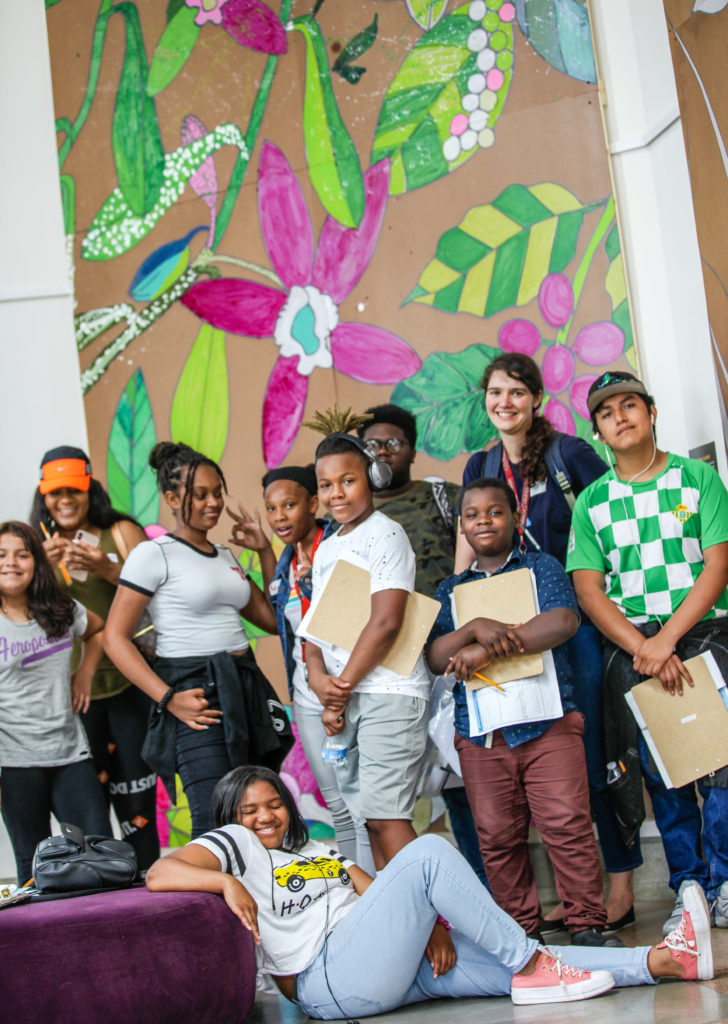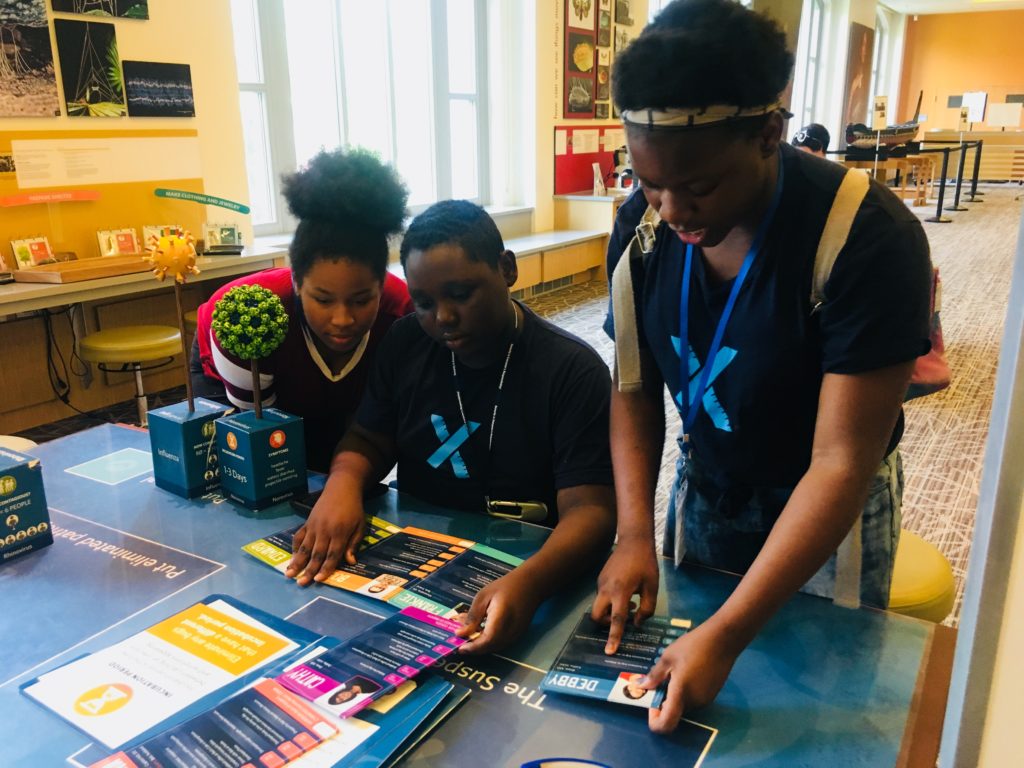By Southwester Staff

Capital Experience Lab (CapX for short) is a group of educators who on Jan. 29, submitted an application to open a 6th-12th grade public charter school in the vicinity of the L’Enfant Plaza Metro after four years of pilot programs in Southwest. CapX offers a unique learning model that integrates a rigorous academic curriculum and hands-on experiences in DC’s museums, government agencies, and other community learning spaces. As CapX awaits the Public Charter School Board’s public hearing (March 15) and a vote on their application (April 19), the team continues to connect with youth and organizations in Southwest.
CapX describes itself as a school designed by DC teachers, students, and families to leverage DC resources for DC students. The team has a particular focus on increasing rates of postsecondary success for Black, Latinx, special education, English learners, and at risk students in the District of Columbia. Drawing on years of DC-based classroom experience, the team has developed an experiential learning model that supports student achievement, personal agency, and a sense of ownership within the city.
The CapX team hosted their first summer program in Southwest in July 2017, thanks to hospitality from Washington Global Public Charter School, who offered a space for CapX to give a free full-day academic program that summer. One group of rising 7th and 8th graders studied civil rights and the First Amendment by visiting the Newseum, the National Museum of African American History and Culture, and the American History Museum. CapX arranges for students to interact with experts as part of every unit, so students met journalists Nia Malika-Henderson and Jonathan Capehart, as well as best-selling author Kitty Kelley.
Another student group that summer studied solar energy and the grid by visiting the American History Museum and the US Department of Energy. Community organization Grid Alternatives came to Washington Global so that students could participate in a mock solar panel installation. Students also met with a former organizer from DC Sun who answered questions about what it took for neighbors to work together to purchase solar panels collectively at a cheaper rate. Student and family feedback after the summer program was positive. One rising 8th grader stated in his end-of-summer survey, “Every day I would wake up looking forward to what we were gonna do later on that day. Especially when we would go to the museums.” The most common piece of parent feedback was to offer additional programming.
CapX summer programming developed from initial groundwork laid by native Washingtonian and CapX Board Chair, Nik Apostolides. He began imagining a public or public charter school that immersed students in DC’s museums and cultural scientific institutions in 2010, when he was Associate Director of the National Portrait Gallery. Some community members had written letters and called the museum to complain about young people hanging out on the gallery steps. Nik saw this as an opportunity for the museum to step up its youth engagement efforts and invite more teens into the museum for meaningful programming. As a result, he entered a collaborative effort with the DC Public Library and the Hirshhorn Museum. This led to a program in the summer of 2011 in which teens used the resources of DCPL, the National Portrait Gallery, and the Hirshhorn’s Art Lab to design clothes, plan a fashion show, and host a community event in the Portrait Gallery’s Kogod courtyard.
In a 2013 interview with London’s Financial Times, Nik described the philosophy that guided the collaborators’ approach to supporting teen leaders: “We needed to give them creative control and a way to tell their own story.” The program at the Portrait Gallery was a one-off event; however, it inspired Nik to imagine a school that more intentionally supported DC students in harnessing the resources of their city’s institutions.
Nik searched for educator team members to join him in testing a school model that integrated social emotional supports as well as visits to community learning sites, including museums, into the school day on a regular basis. Founding team members Alison Gillmeister, Patrice Jones, and Bethany Fleming, who all taught together at Center City PCS, joined his team. These teachers collaborated with Nik and a broader team to begin defining and testing the CapX approach with a wide range of student needs and interests in mind.
Alison, Patrice, and Bethany led teachers in offering CapX summer and Saturday programs in a continuous cycle following their initial success in 2017. Within Southwest, students visited and learned from the US Botanic Garden, the National Museum of the American Indian, the Air and Space Museum, and the Holocaust Memorial Museum. CapX led students on meaningful learning experiences in other parts of the city as well, including at the Washington Youth Garden and the Frederick Douglass House.
These experiences allowed the CapX team to collect feedback from students and families. They also gathered academic data about what worked and did not work in the community-based learning model. Each program allowed the team to build awareness of how to ensure academic progress by combining both traditional and experiential learning methods. From the beginning, the team also placed a heavy emphasis on social emotional learning, identity work with students and staff, and structures to support positive teacher-student-family relationships.
By 2019, CapX began considering a charter application to become a school. As Executive Director Lanette Dailey-Reese joined the team, she supported the teaching team in deepening community connections in a way that included but also extended beyond students and families. She and Alison met with Donna Purchase of the Southwest Neighborhood Assembly (SWNA) and received recommendations of where to learn more Southwest history.
CapX hosted a reunion for former students at Westminster Presbyterian Church. Thanks to the advocacy of community leader Thelma Jones, members of the CapX team volunteered at Amidon Bowen’s math night. CapX shared a presentation with ANC6D. The educator team got connected with GOOD Projects and KidPower DC and had the opportunity to host programming in partnership with these organizations. Alison attended after-school special events at the Southwest Interim Library. CapX volunteers interviewed Saturday morning visitors to the SW Farmers Market at the Lot at 4th and M St. SW.
During the COVID-19 pandemic, CapX continued to find space for collaboration in Southwest. Beginning in the summer of 2020 and continuing through this winter, CapX has offered virtual programming to Kid Power DC, which provides after school support to students at a range of DC Public Schools, including Amidon Bowen and Jefferson. CapX has also provided weekly in-person support and enrichment to students who attend the GOOD Projects Learning Hub at Greenleaf Garden Apartments.

In January 2021, the CapX team submitted its charter application to the PCSB for the second time. The CapX team was denied approval in 2020 in a 4 to 3 vote. Board members encouraged the team to reapply. PCSB Board Chair, Rick Cruz, described the board’s “unanimous” belief in the CapX vision and potential “value add” of the CapX model to students and families in DC. The board is currently in the midst of the 2021 review process, which will determine whether CapX receives approval to launch with a 6th grade class in fall 2022.
As the CapX team prepares to participate in this year’s public hearing, which will be hosted on Zoom on March 15, and to hear the vote on their application on April 19, they continue their routines of student and family engagement both in and beyond Southwest. Recently, the team supported two youth leaders in the Pocket Change competition, sponsored by SWNA and the SWBID. The team is also looking ahead toward this summer and planning opportunities for joyful, free, neighborhood-based learning that will bring together pods of approximately 11 students with two teachers. CapX anticipates offering at least one pod in Southwest.
To learn more about Capital Experience Lab, visit them online at www.capxlab.org or via social media using the Twitter and Instagram handle @capxlab. Feel free to send feedback or suggestions for community projects to information@capxlab.org.

